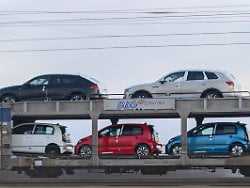Corona and chip shortage
Europe’s car market collapses
01/18/2022 09:54 am
Europe’s consumers bought fewer cars last year than they have in more than three decades. And an expert gives little hope for fundamental improvement. The course of the pandemic is too uncertain, and the supply chains are still too full of holes.
The lack of microchips for the car industry caused the new car market in the EU to fall to a record low last year. As reported by the European manufacturers’ association Acea, the number of new registrations in the European Union in 2021 fell by 2.4 percent to 9.7 million vehicles compared to the previous year. This is the lowest value since the statistics were introduced in 1990.
In Germany, around ten percent fewer cars were registered in 2021 than in 2020, which was already marked by the Corona crisis. In Italy (plus 5.5 percent), Spain (plus 1.0 percent) and France (plus 0.5 percent) however, there was a slight increase.
As the German Association of the Automotive Industry (VDA) announced in Berlin, “the lack of semiconductors in particular” is putting a strain on global supply chains. “In addition, shortages of other preliminary products and raw materials and rising prices for energy and logistics are causing problems for the industry.”
“Even 2022 will probably not bring a turnaround”
In December, the EU new car market collapsed again, falling by almost a quarter. In Germany, in the last month of the year, new registrations fell by almost 27 percent compared to the same month last year.
According to the management consultancy EY, an improvement in the situation is not to be expected for the time being: “The economic prospects have clouded over recently, because Omikron is leading to new uncertainties and risks – not least for the global supply chains,” explained EY automotive market expert Peter Fuss. In addition, the chip crisis still has the new car market firmly in its grip, and an improvement in the supply of semiconductors is currently not in sight in view of the high demand.
“There will probably be no trend reversal on the new car market in 2022 either,” explained Fuss. “Even if sales increase slightly compared to 2021, the market would be far from pre-crisis levels. So the recovery is postponed to 2023.”
The biggest losers in 2021 were the French manufacturer Renault with a drop in sales of 10.2 percent and Ford with a drop of 19 percent. Market leader Volkswagen sold 4.8 percent less than in the previous year. The losses at rival Stellantis (minus 2.1 percent) were only about half as high. The German brand Opel, which belongs to the Italian-French group, even increased slightly. While Daimler sold 12.4 percent less of its vehicles, the Munich competitor BMW coped better with the lack of chips. Its sales increased by 1.5 percent.
